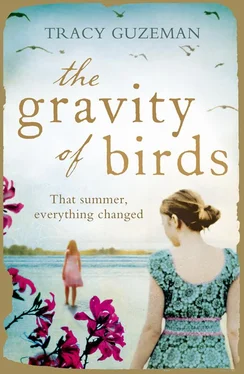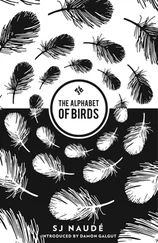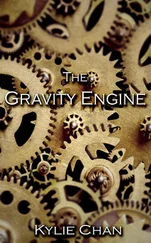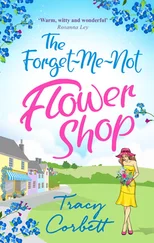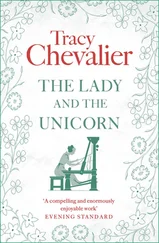He’d been in her husband’s office—her husband being the recently appointed head of acquisitions for Foyle’s New York, as well as his new boss—flipping through a portfolio containing photos of the material slated for the coming week’s auction, when he’d looked up from an image of a pair of Sèvres blue-ground vases, circa 1770, to see Chloe’s face regarding him sternly from a framed photo on the credenza.
That’s Chloe , he’d said.
You know her? the man had asked.
She’s my girlfriend , he’d responded automatically, unable to contain the satisfied smile that followed. At the man’s astonished stare, he’d ignored the nagging buzz in the back of his brain and fumbled on, unknowingly digging the trench deeper. He had assumed it was not the image but the frame that was the treasure—a Romantic Revival, circa 1850; brilliant gold leaf over gray bole; an oval of flowers and leaves with a deep scoop and a concave outside edge; in immaculate condition aside from one hairline crack in the scoop. A piece he might covet if not for the fact he already had what lay inside the frame. So he’d opened his mouth and sealed his fate.
Seeing the picture of Chloe had made him understand both the necessity of the superlative and the fateful pride associated with acquiring something of beauty. He could feel the soft swell of her cheek under his thumb, brush a finger over the freckles dotting her nose. He could smell the exotic scent she wore, frangipani, which made him slightly queasy, like being at sea. In Australia, they call it ‘Dead Man’s Finger,’ she’d told him once, before pressing her body against him under the starched hotel sheet that skimmed their shoulders. He’d shivered at the sweep of her dark hair across his chest. How had he defined happiness before her?
He’d watched other men’s eyes follow her when they made their way to a table in a restaurant, had seen the subtle turn of a head on the street, followed by the gaze sizing him up. They were wondering how he’d gotten so lucky. He’d wondered himself. When he’d asked her why she was with him, she’d simply said, ‘You’re smarter.’ If he’d thought to ask, ‘Than whom?’ he’d just as quickly squelched the idea, not caring to know whether the ‘whom’ in question was generic or specific. It was enough to be with her. He became more attractive by proxy.
But when they were apart, the feeling dogging him was a murky stew of incredulity, suspicion, and the numbing sensation of being struck dumb by his good fortune. So struck, or so dumb, his first thought hadn’t been to wonder why Chloe’s picture was on his boss’s credenza.
‘How the hell could you?’ she’d demanded, in a tone that alarmed him.
‘How could I ? Can I just remind you, of the two of us, you’re the one who’s evidently married here? The man asked me a question. Was I supposed to lie? Besides, you’re missing the more important point. I’ve been let go. Fired. Three years building my reputation at one of the best auction houses in the country, gone.’
‘No, you’re the one who’s missing the point. Of course you were supposed to lie. Anyone else would have known that. How could you tell him I was your girlfriend?’
‘Well, clearly I didn’t realize who I was saying it to, for one thing. But now he knows. Is that a terrible thing? I hate to point out the obvious, but you are, after all, my girlfriend.’
The silence before she’d answered provided him horrible clarity. ‘Don’t you understand what you’ve done, Stephen? How could you be so unbelievably thick?’
At least that was explainable. His entire life he’d been blessed with an exceptional gift for misunderstanding, especially when women were involved—their desires, their needs, their way of thinking. Even his mother, on more than one occasion, had given him a studied look, as if he wasn’t her child but an alien species deposited in her house. ‘Why in the world would you think I meant that?’ she’d ask. Those were the times he wished for a sister instead of being an only child, longing for someone who might help him to decode the inexplicable language of women.
He dismissed the whispers that trailed after him, hissed at a decibel just loud enough to be heard— Used him. Knew someone like that would humiliate her husband. She was getting even— and focused on those memories that couldn’t be warped, in hindsight, into calculated, duplicitous acts: Chloe weaving her fingers through his as they walked in Central Park at midnight; Chloe biting down on her lower lip as she straightened his tie, a look that ruined him every time; Chloe stuffing his pockets with throat lozenges before they went into the movie theater, sequestering themselves in the back row, where his hand could wander across the top of her thigh, unseen.
The sacking (as he had come to refer to it) and subsequent breakup were followed by an equally humiliating nine-month period when he looked for work wholeheartedly, then halfheartedly, then not at all. As a patron of the arts, of local politicos and any cause célèbre, Chloe’s husband had no problem calling in favors. Stephen quickly found himself blacklisted from any job, or any future, he might have deemed worthy. There would be no significant curatorial position at a major museum, nor would he be overseeing acquisitions for any Fortune 500 company. There would be no managing of conservation personnel, no addresses delivered to the American Institute for Conservation of Historic and Artistic Works. And though he could not picture himself lecturing behind a podium considering his general dislike of people in groups numbering more than five, his academic prospects were equally dim. Worst of all, he no longer worked at the most prestigious auction house in the city, at least, the most prestigious since scandal had tarnished the reputation of both Christie’s and Sotheby’s.
Giving up his apartment, he camped out on the futons of various colleagues, quickly wearing out his welcome and exposing those relationships for what they were—the shallowest of acquaintances, not durable enough to withstand the weight of one party polishing off whatever alcoholic beverage was in the refrigerator, even if it was a wine cooler, leaving chip crumbs to gather in the crevices of the sofa cushions, and bemoaning his future state in a tone that vacillated between whining and suicidal.
When nothing materialized in the way of gainful employment, he took to brooding at his father’s gallery, shuffling invoices from one pile to another to pass the time. He might have worked there—Dylan had offered—but Stephen assumed the offer was motivated more by pity than by any real desire for his company. The gallery was already being managed by someone genial and sincere, with more enthusiasm than Stephen could have summoned, and had he accepted the offer, he would not have been the gallery’s owner, or even co-owner, but an assistant to the manager. If the lack of a title hadn’t been enough to dissuade him, his father’s near-palpable disappointment was.
‘Best get back on the horse, boyo, and stop muckin’ around feeling sorry for yourself. You’re not the first man to make such a colossal blunder.’
‘This is an odd pep talk.’ Stephen sorted through flyers, unable to meet his father’s eye.
‘People forget, son, but you’d make it easier for them if you were just a little less …’
‘A little less what?’
His father only shook his head. ‘Never mind. You’re today’s news, but that won’t last forever. Some other poor unfortunate will take your place soon enough, and he’ll likely have less talent than you have, Stephen. Thank God, talent doesn’t go away just because you got caught with your pants down. Though, geezus, I wish it hadn’t been with somebody else’s wife.’
Читать дальше
